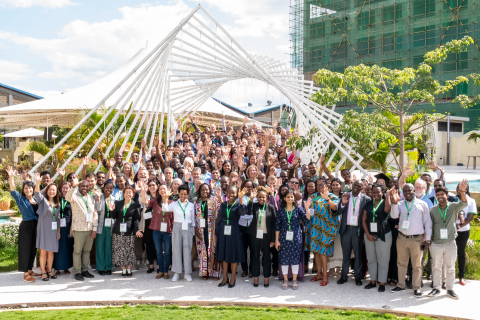
Dialogue between researchers and policymakers common thread at EfD’s Annual Meeting
EfD’s 17th Annual Meeting, claimed to be the biggest and best conference on the application of environmental economics in the Global South, encompassed an entire week of courses, plenaries, research presentations, and collaborative meetings involving around 200 people from all over the world.
The Annual Meeting in Accra, Ghana on October 5 – 8, featured six keynote presentations, 38 parallel sessions with 121 research presentations, and open sessions with EfD’s seven collaborative programs.
In addition, there were three courses and a policy day conducted during the three days preceding the Annual Meeting itself.
IGE teamed up with SETI
The Inclusive Green Economy in Practice Program (IGE) had a three-day workshop where 26 civil servants from five countries in East Africa met with 20 researchers from the EfD network, mainly from the Sustainable Energy Transitions Initiative (SETI). The IGE program had a focus on green energy transition this year. Teaming up with SETI ensured that the participants had access to some of the best and most relevant research in this field.
Training for policy impact
There was also a two-day training session for 24 researchers from the EfD centers on Policy Engagement and Science Communication. They took part in presentations, learned about communication, discussed challenges and opportunities, and built a community of practice within EfD for greater policy impact.
Gender was highlighted
The EfD Early Career Fellowship program also met for a three-day course on Gender Analysis in Development Economics. The 19 early career researchers from the EfD network discussed the concept of gender and its relevance to research, equipping themselves with methodologies to analyze gendered impacts. The pre-meeting sessions also included a Policy Day at the University of Ghana.
Policy Day
The Policy Day highlighted the important work of EfD Ghana in contributing to the implementation of policies for a sustainable fishing industry. Several senior civil servants and other stakeholders, including the Deputy Minister of Fisheries and Agriculture attended, as well as researchers from the EfD network. The influential dialogue between researchers and policymakers regarding fisheries management in Ghana was a common thread throughout the week. Professor Wisdom Akpalu presented his experiences from these policy dialogues in the Policy Engagement and Science Communication course. This was also the theme of the policy day and at the award dinner, where Wisdom Akpalu received the EfD Impact Award.
Themes and Keynote Speakers:
Erik Sterner, AI for a green transition
Erin Sills, On carbon offsets from forest conservation
Subrehendu Pattanayak, How to do Environment and Development Economics research: A view from the trenches
Priya Shyamsundar, Economics in Conservation Practice
Jyotsna Jalan, Changing Social Norms: Effectiveness of Participatory Theatre
Edwin Muchapondwa, Trade-Offs Between Communities’ Welfare and Wildlife Conservation in Africa




